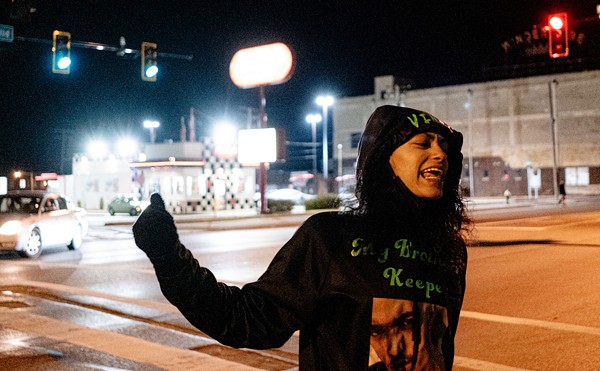Mancini asserts that he was panhandling March 11 on Euclid Avenue near Playhouse Square. An officer identified as "Officer Jordan" saw him and pointed at him from a passing car before ultimately asking him to come over. At the car, the officer began questioning Mancini and his role in the lawsuit. "Does the ACLU know you're sitting in front of the Playhouse?" he asked Mancini.
According to the affidavit, Mancini said that "he was in front of a closed business," referring to Moko Coffee.
Mancini wrote that he felt "so shaken up and felt so intimidated" that he immediately got on the next bus to pass by Euclid. It happened to be the wrong line, so he rode needlessly out of the city on the No. 90, rather than the No. 15. He walked three hours home to Garfield Heights in the cold, he wrote.
"I am even more afraid of panhandling in Cleveland now, because the police are acting angry that I filed my lawsuit," Mancini wrote. "They are stalking me and harassing me to intimidate me. I feel they are retaliating against me."
***
Originally published Feb. 28
With the backing of the Northeast Ohio Coalition for the Homeless and the ACLU of Ohio, local disabled veteran John Mancini filed a federal lawsuit against the city of Cleveland over its anti-panhandling laws.
(Read the full civil complaint here.)
At issue are two Cleveland ordinances that restrict solicitation on sidewalks and roadways. "Solicitation" is defined as speech that "request[s] an immediate
donation of money or other thing of value from another person, regardless of the solicitor’s purpose or intended use of the money or other thing of value. The solicitation may be, without limitation, by the spoken, written, or printed word, by gesture or by other means of communication.”
Mancini states that in December 2016 and January 2017, he "was ticketed four times and convicted once for violating Cleveland’s Anti-Panhandling Ordinances. During this time, and since, he has also been repeatedly told to leave areas where he has panhandled, and threatened with arrest....Since his tickets, the police threats and harassment against [him] have escalated, and he is now too afraid to panhandle in downtown Cleveland."
Recently, according to the lawsuit, Mancini has posted up on Euclid Avenue near East 14th Street, with a sign that reads: "wartime vet; can you please help a vet trying to get by; your help appreciated.”
According to NEOCH and Mancini, the Cleveland Police Department issued more than 5,800 tickets for violations of the Anti-Panhandling Ordinances between 2007 and 2015. Currently, violation of the ordinance comes with a $55 fine. Ballparking the hypothetical impact of those violations — assuming the tickets weren't nullified in court or not paid — that's more than $319,000 in revenue off the backs of Cleveland's homeless population in that time span.
On top of fines, there are court costs, which tend to grow as quickly as criminal dockets in Cleveland Municipal Court. NEOCH points out that homeless men and women often don't have reliable transportation and, in all honesty, can't even afford the fine in the first place; many people tend not to show up to court hearings. At that point, Cleveland police identify and jail the no-show defendants.
“In addition to being unconstitutional, anti-panhandling ordinances are bad public policy,” Mike Brickner, senior policy director at the ACLU of Ohio, said in a public statement today. “Homelessness and poverty are distressing issues, and being confronted with them can make us feel uncomfortable. But criminalizing poverty—especially by ticketing or jailing individuals in violation of the First Amendment—is not a solution.”
As Mancini and NEOCH claim in the complaint, "These restrictions criminalize certain types of speech based on the content of the message conveyed. The Anti-Panhandling Ordinances further stigmatize and demean individuals who are homeless and very poor in Cleveland."
***
March 11 affidavit:
Plaintiff John Mancini affidavit by sandyatscene on Scribd













